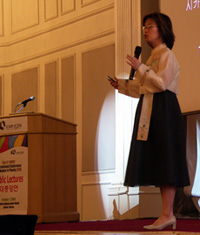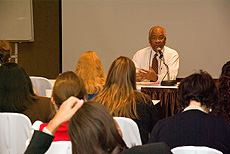Kim, White speak at women in physics conference
 |
| Fermilab Deputy Director Young-Kee Kim gives the keynote lecture at the IUPAP women in physics conference in South Korea in October. |
A conference designed to assess and boost the participation of women in physics drew more than 300 attendees from around the world last month.
The International Union of Pure and Applied International Conference on Women in Physics gave attendees a chance to hear about physics projects and women scientists in other countries.
The U.S. delegation to the women in physics conference in Seoul, Korea, included two Fermilab scientists, Deputy Director Young-Kee Kim and Herman White. They presented information on the status of the particle physics field and Fermilab's SciBooNE experiment.
"Science brings everyone together, but add the dynamics of social issues and women from different cultures and nations and you have an really interesting conference," White said.
The women in physics conferences take place every three years in a different country. They bring together women and men from more than 65 countries to review conditions, propose ways to improve global participation and develop action plans to improve the status of women in physics in their home countries.
"The conferences were established by people who recognized that all fields of science progress most rapidly when they draw from the complete available pool of talented people," White said.
Kim lectured to conference attendees on current topics in particle physics.
She also presented a keynote lecture on particle physics to hundreds of Korean secondary school and undergraduate students as part of the conference outreach activities.
"It was an honor to be asked to present on particle physics and the future of Fermilab science at this meeting," Kim said. "It was a lot of fun to communicate with students in my home country."
White delivered a report on the status and physics of the SciBooNE experiment. He also presented information on the American Physical Society's site visit process.
The next conference in this series will take place in South Africa.
Additional information can be viewed at the conference Web site.
--Herman White

Fermilab scientist Herman White gives a lecture at the IUPAP women in physics conference in October.
|